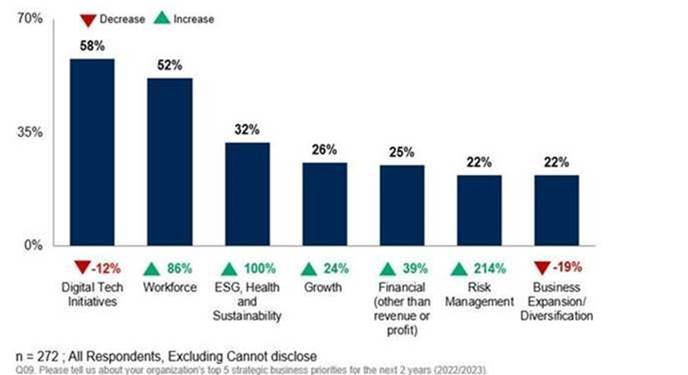Boards are increasing their risk appetite into 2022 as long-term economic uncertainty, disruptive business models and cost inflation from supply chain shortages grow, says Gartner.

Gartner’s recent Board of Directors survey presented at the US Gartner Symposium was conducted online from May to June this year and included 273 board director and member respondents across the US, Europe and APAC.
According to Partha Iyengar, distinguishing research vice president at Garter and leader of the research, boards embraced a “try fast, fail fast approach” during the pandemic, recognising the need for risk taking as the only alternative to standing still.
“Into 2022, boards will continue taking risks such as making technology investment decisions with incomplete information or making financial bets without up-front visibility around a guaranteed return,” said Iyengar.

Investments in digital technology initiatives was ranked as a top strategic business priority by more than half of the respondents (58 per cent), however this has decreased from 69 per cent in last year’s report.
“Having invested so much in digital business over the past 12 to 18 months, enterprises are taking a pause to validate their strategy and ensure ROI,” said Iyengar.
“The core focus is now on technology integration and creating a more enduring and systemic digital economic architecture, where technology is infused throughout the business and drives business outcomes.”
Environmental Social and Governance (ESG) as well as Diversity Equity and Inclusion (DEI) are now embedded into Board agendas, according to Brian Ferreira, Gartner’s managing executive partner.
“Influential business CEO and board chairs have been vocal about moving Australia forward on these issues, requesting government to give more firm guidance so that they know how and what to adjust by when,” says Ferreira.
Despite growth in the adoption of digital technologies, boards are now faced with the challenge of the skills shortage.
“Talent acquisition and retention of critical roles have created a complex supply and demand situation, which has further been challenged by state border restrictions. Key business and government debates are in play about post-border opening and immigration to solve talent challenges,” says Ferreira.
The report reveals that the role of the CIO as an advisor to the board on digital business issues is gaining visibility and respect, however CIO partnering and turnover in Australia remains high.
According to Ferreira, “CIOs haven’t yet convinced the Board that they understand the business well, are able to manage risk and can translate technology into growth. Technology initiatives are often given to business executives rather than CIOs. This is slowly changing, but CIOs need to do more to be welcome at the Board table.”



_(20).jpg&h=140&w=231&c=1&s=0)
_(23).jpg&h=140&w=231&c=1&s=0)
.png&h=140&w=231&c=1&s=0)





 iTnews Executive Retreat - Security Leaders Edition
iTnews Executive Retreat - Security Leaders Edition
 iTnews Benchmark Awards 2026
iTnews Benchmark Awards 2026
 iTnews Cloud Covered Breakfast Summit
iTnews Cloud Covered Breakfast Summit
 The 2026 iAwards
The 2026 iAwards







.jpg&h=271&w=480&c=1&s=1)




_(1).jpg&h=140&w=231&c=1&s=0)



